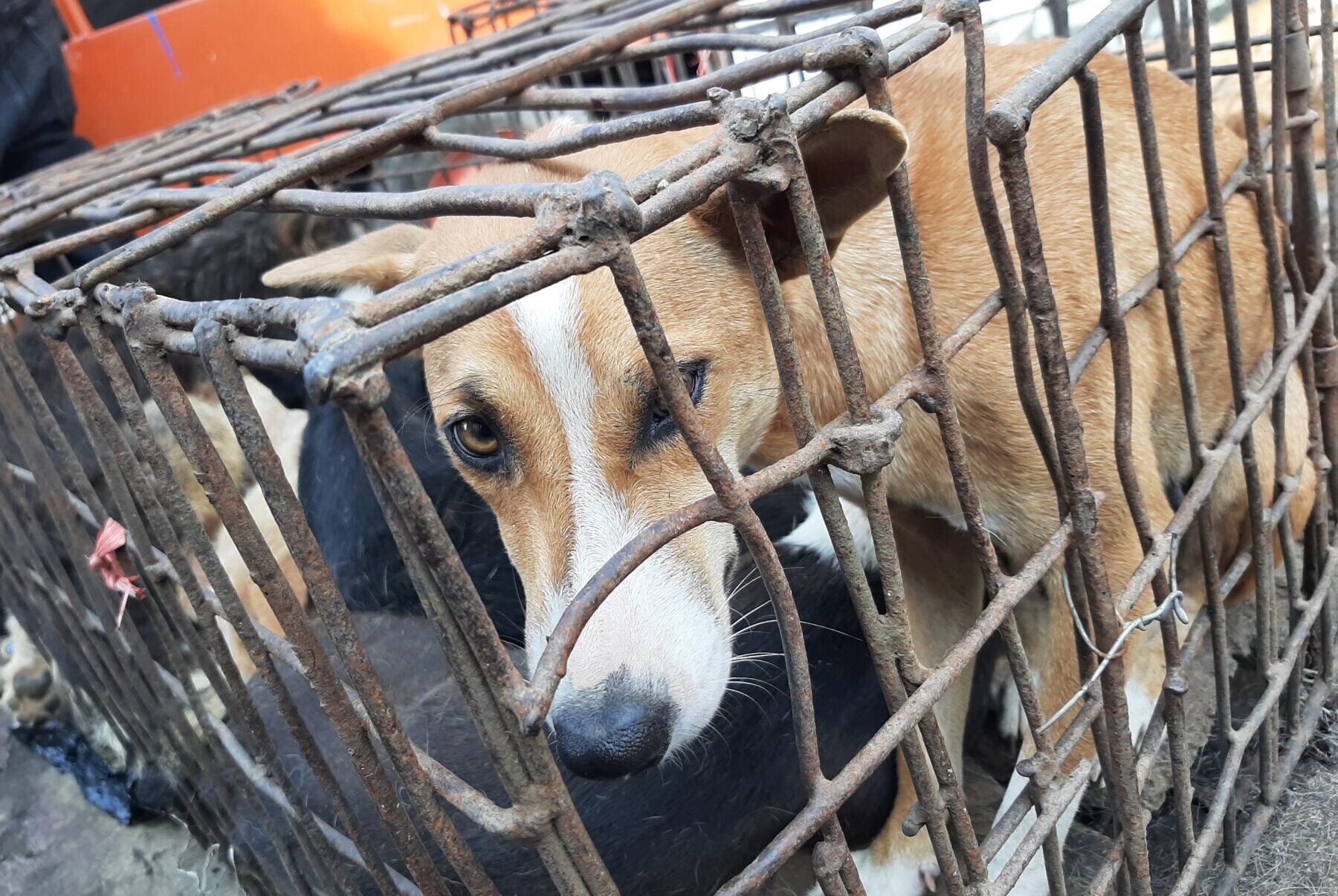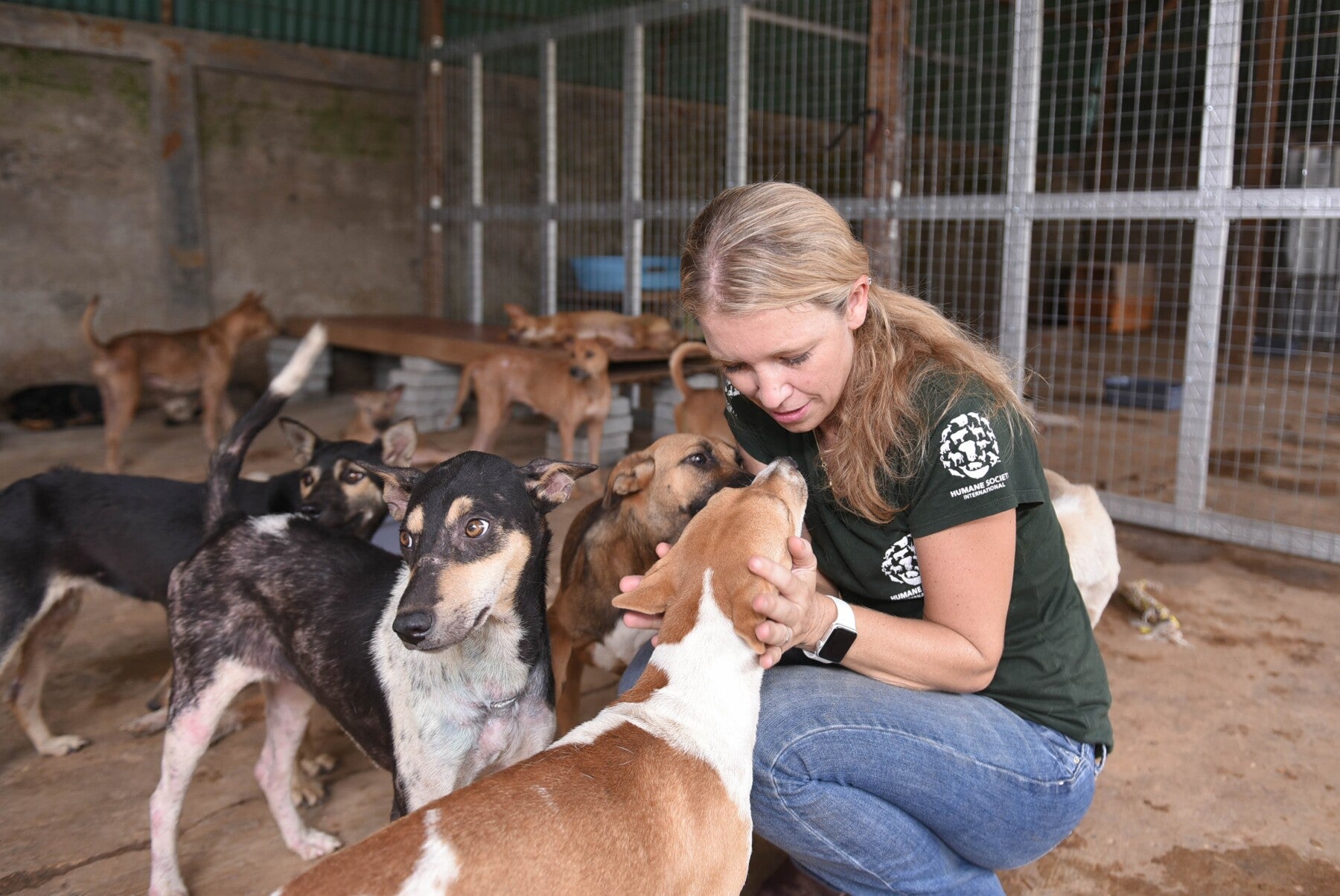
Every year, millions of dogs are brutally captured and transported throughout Indonesia for the dog meat trade. Many are stolen family pets or animals snatched from city streets and rural communities. They are crammed into cages and sacks so tightly that they can’t move, with their mouths bound shut so they can hardly breathe and driven on excruciatingly long journeys on bikes or overcrowded trucks to supply markets, slaughterhouses and restaurants. Many die from suffocation, dehydration or heatstroke before they reach their final destination. For those who survive, their grim fate is to watch others being brutally killed as they await their turn to die. Their anguish and terror are unimaginable.
Donate now to help stop this cruel trade and protect all animals.
Humane Society International is a founding member of the Dog Meat Free Indonesia (DMFI) coalition, a coalition of international and national animal protection organizations with a shared commitment to end the dog meat trade nationwide.
Human health risk
DMFI investigations have revealed not only immense animal suffering, but also the serious threat posed to human health. The dog meat trade encourages the movement of huge numbers of dogs of unknown disease status between provinces (and islands). The World Health Organization (WHO) has explicitly highlighted the dog meat trade as a contributing factor to the spread of rabies in Indonesia. As the dog meat trade is the only known mass and unregulated movement of dogs from different cities, provinces and islands, it all too easily facilitates the movement of rabies-positive dogs to supply densely populated dog meat eating “hot spots” throughout the nation, including those areas that have worked tirelessly to secure a “rabies-free” status, for example, the capital city of Jakarta. Such mass movements of dogs clearly breach rabies control recommendations.
The unsanitary conditions at slaughterhouses and open markets, is of added and equal concern, with those involved in the dog meat trade—traders, slaughterers, vendors and consumers—at risk of being exposed to rabies and other zoonotic diseases. There is evidence from throughout the region, including Indonesia, of rabies-positive dogs being sold and slaughtered for human consumption in slaughterhouses and markets, including North Sulawesi’s infamous “traditional markets” where dogs and cats are sold and slaughtered alongside chickens, ducks and wildlife species.
So, while only a minority of Indonesian residents (an estimated 4.5%) ever actually consume dog meat, the trade threatens the safety of the whole country.
Who eats dog meat?
Most people in Indonesia don’t eat dogs. In some areas, including Manado and Medan, dog meat is considered a traditional type of food, and is most popular amongst Batak and Christian populations. Its consumption is often linked to certain festivities including Thanksgiving, Christmas, and family celebrations such as weddings and baptisms.
As in many other parts of Asia, dog meat is also consumed in the mistaken belief that it has health properties, such as curing asthma or dengue fever, as a general boost for the immune system or to improve male stamina. Contrary to common misconception, dog meat is not eaten because it is a cheap protein source, and, in fact, it is no more or less expensive than other meats.
Growing opposition
Many countries and territories across Asia—such as the Philippines, Taiwan, Singapore, Hong Kong, Thailand and Malaysia—have already banned the dog meat trade and/or consumption of dogs, in recognition of the cruelty and health risks that are involved. Demand for dog meat is declining and opposition to the dog meat trade has become increasingly vocal throughout the region, including in Indonesia, particularly among younger generations, due to the exponential growth in pet ownership and associated concerns for animal welfare.
Call for a ban
There are no regulations in Indonesian law explicitly prohibiting the trade in and slaughtering of dogs for human consumption. However, there are a number of existing regulations and laws regarding consumer safety, violence in public, transportation of livestock, animal abuse and theft of animals, as well as animal husbandry and animal quarantine, that, if properly and strictly applied, could dramatically curtail if not stop the dog meat trade as we know it.
Through the Dog Meat Free Indonesia coalition, we are campaigning for an outright ban on the dog meat trade. Add your voice by taking action now.

Signs of progress
-
- 2017 – present: the province of Bali, Indonesia’s most popular tourist destination, tackles the dog meat trade; dog meat vendors have been closed down, with the authorities stating that they will take action against those who continue to trade in and sell dog meat.
- September 2018: the Central Government issued a Directive to all provincial, regency and city authorities calling on them to take action to discourage dog and cat meat consumption and to implement measures to tackle the trades wherever they occur. This followed a statement by the Director of Veterinary Public Health describing the dog and cat meat trades as “torture for animals.”
- June 2019: the Regency of Karanganyar (Central Java, a key dog meat-eating province), announced a ban on the dog meat trade in its jurisdiction, offering small financial compensation packages to those reliant on the dog meat trade to assist with their transition to alternative livelihoods.
- December 2019: following DMFI investigations exposing Central Java’s rampant dog meat trade, including Solo city where more than 13,700 dogs are slaughtered each month, Governor Ganjar Pranowo met with DMFI and publicly called on the Mayor of Solo city to take action to tackle the trade. The Head of Agriculture of Central Java also released a statement reminding those involved in the dog meat trade that dogs are not considered food animals under the law, and that transport of dogs for human consumption is punishable by law.
- December 2019: in collaboration with DMFI, Yogyakarta (“Jogja”) city erected billboards in two prominent locations, explicitly stating that dogs are “Man’s best friend and not for consumption.”
- April 2021: the Regency of Sukoharjo banned the dog meat trade.
- May 2021: the city of Salatiga banned the dog meat trade.
- May 2021: the first ever interception of dog meat traders in Indonesia took place in Kulon Progo Regency. The traders were transporting 78 dogs. The surviving 63 dogs are now being cared for at a local animal protection group’s shelter, and DMFI has sent vets and vaccinations, deworming treatment and other supplies to assist.
- November 2021: DMFI members worked in collaboration with law enforcement agencies to successfully rescue dogs being trafficked to a slaughterhouse in Sukoharjo. Over 50 dogs were rescued and taken to DMFI’s purpose-built shelter for care and eventual adoption.
- December 2021: DMFI documentary about North Sulawesi’s Live Animal Markets, featuring DMFI Ambassador, Peter Egan, wins Best Documentary Short at Cannes World Film Festival.
- January 2022: Malang becomes first city in East Java to pass local regulations prohibiting the dog meat trade city-wide, following meetings and lobbying by DMFI.
- January 2022 (announced in February): Central Java’s provincial capital city, Semarang, becomes the first provincial capital and 5th region nationwide to pass regulations explicitly prohibiting the dog meat trade throughout its jurisdiction.
- March 2022: Semarang Regency, Blora Regency, Brebes Regency and Purbalingga regency passed directives prohibiting dog meat in their jurisdictions.
- April 2022: Magelang city, Jepara (both Central Java) and Blitar city, Mojokerto City and Mojokerto Regency (all East Java) passed directives prohibiting dog meat in their jurisdictions, bringing the total to 14 cities and regencies nationwide.
- April 2022: The Animal Husbandry Department of East Java Province submitted documents calling on provincial mayors and regents to end the dog meat trade throughout their jurisdictions, and plans to request the governor to enact a province-wide ban.
- May 2022: Magelang Regency and Temanggung Regency passed directives prohibiting dog meat in their jurisdictions
- June 2022: Medan becomes North Sumatra province’s first city to ban the dog meat trade. This is a huge breakthrough given that ~120 – 200 dogs are slaughtered in Medan city every day, and is considered the biggest dog trafficking hotspot in the country.
- July 2022: Central Java Provincial Dept. of Animal Husbandry became second provincial government to issue official recommendations to all regencies/ cities province-wide for them to pass Directives banning the dog meat trade, citing cruelty, the fact that dog meat is not recognized as “food” in Indonesia, and due to the rabies risk.
- August 2022: Surabaya in East Java province became the 18th jurisdiction to pass a Directive prohibiting the dog meat trade, and the 3rd provincial capital to do so.
- September 2022: Special Area of the city of (DKI) Jakarta – the most populous metropolitan area in Indonesia, comprising the capital as well as five satellite cities and three complete regencies, including parts of West Java and Banten provinces – issued a Directive banning dog meat trade. DMFI investigations suggest that in Jakarta, an estimated 9,520 dogs per month or around 340 dogs every day are killed for meat so this new Directive could save thousands of dogs each month.
The Dog Meat Free Indonesia coalition believes that strong actions must be extended to the whole of Indonesia in order to shut down the brutally cruel, unsanitary and unsafe dog meat trade. Speak out and donate now to help dogs and other animals in need.
